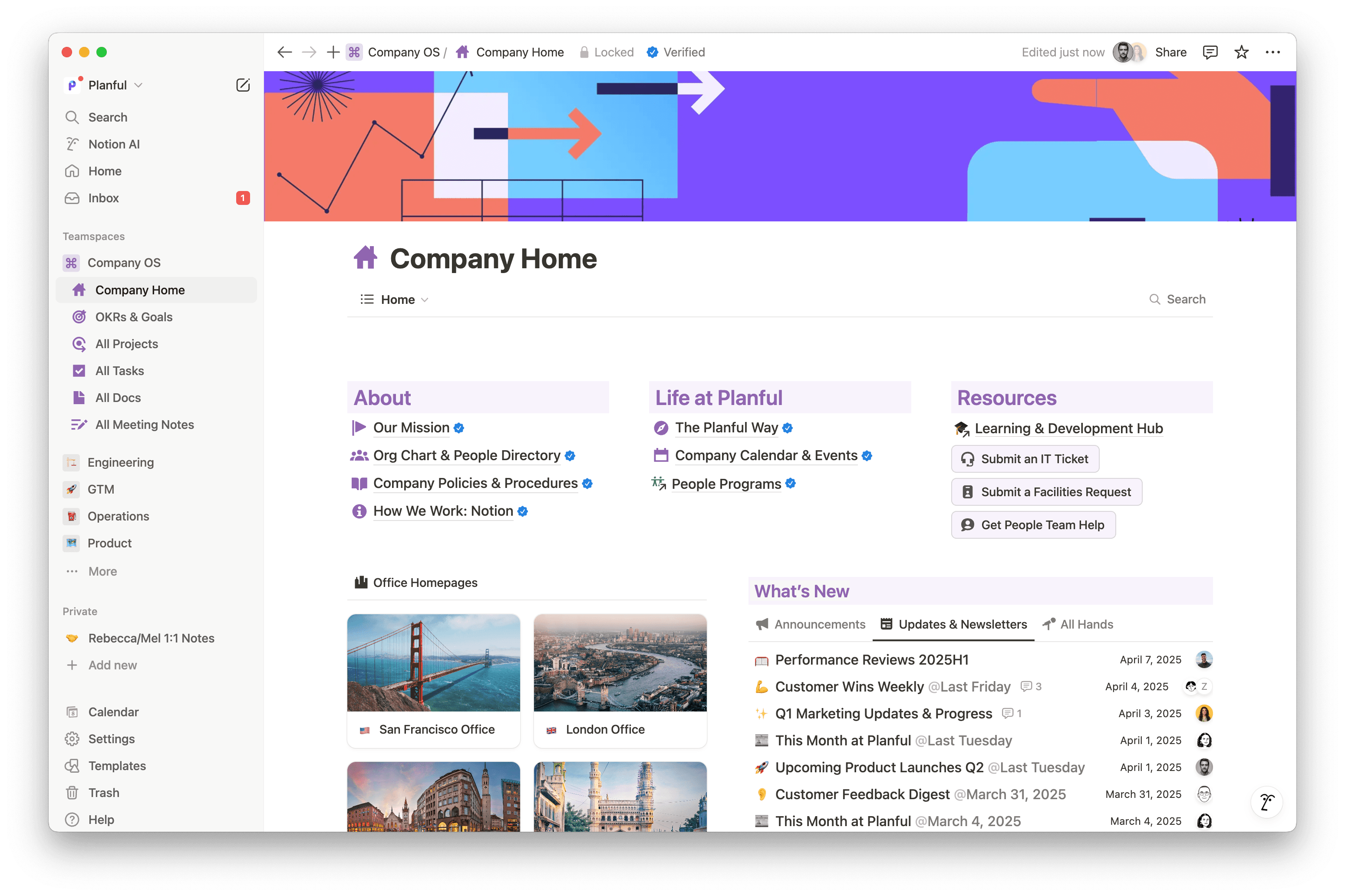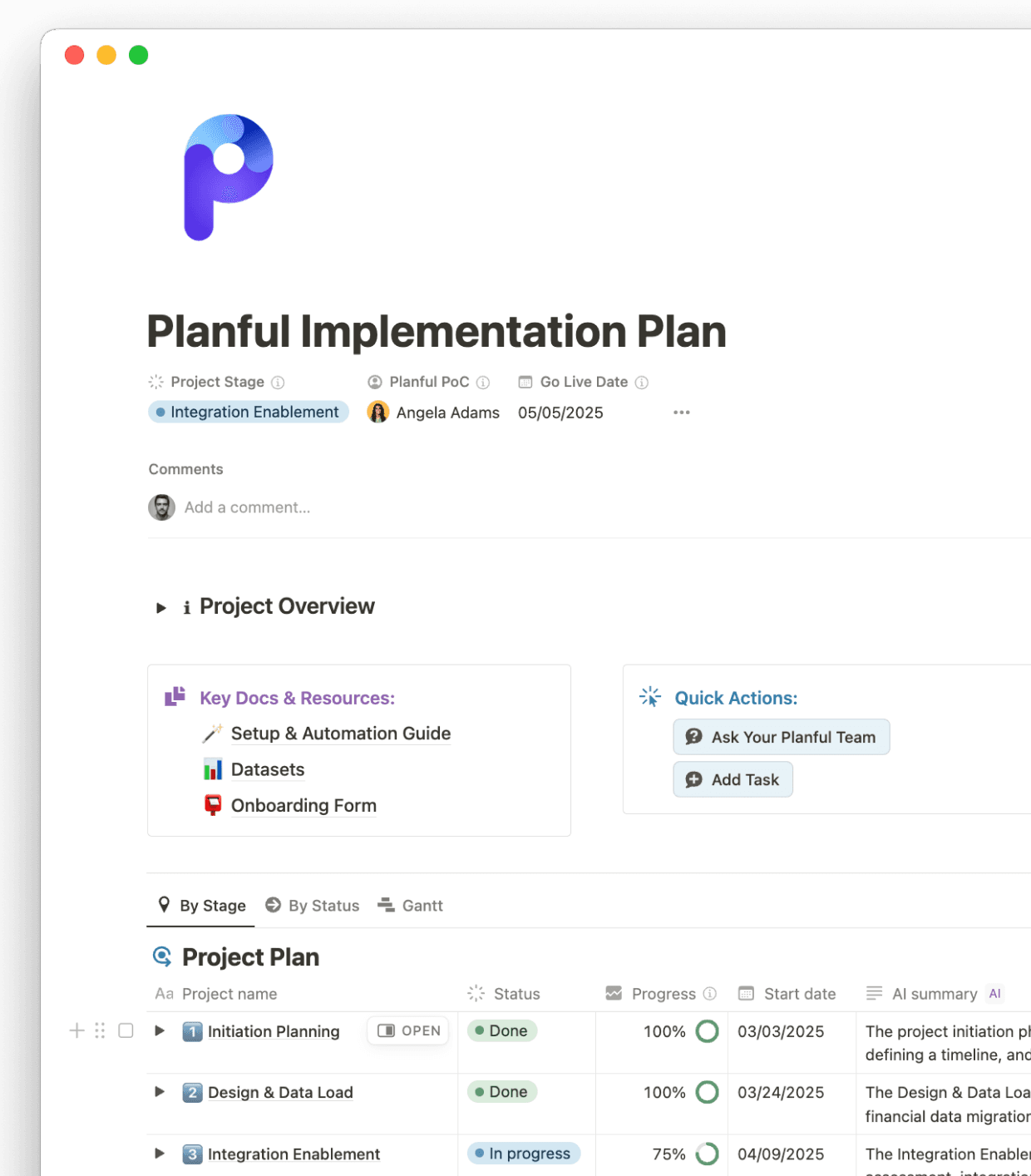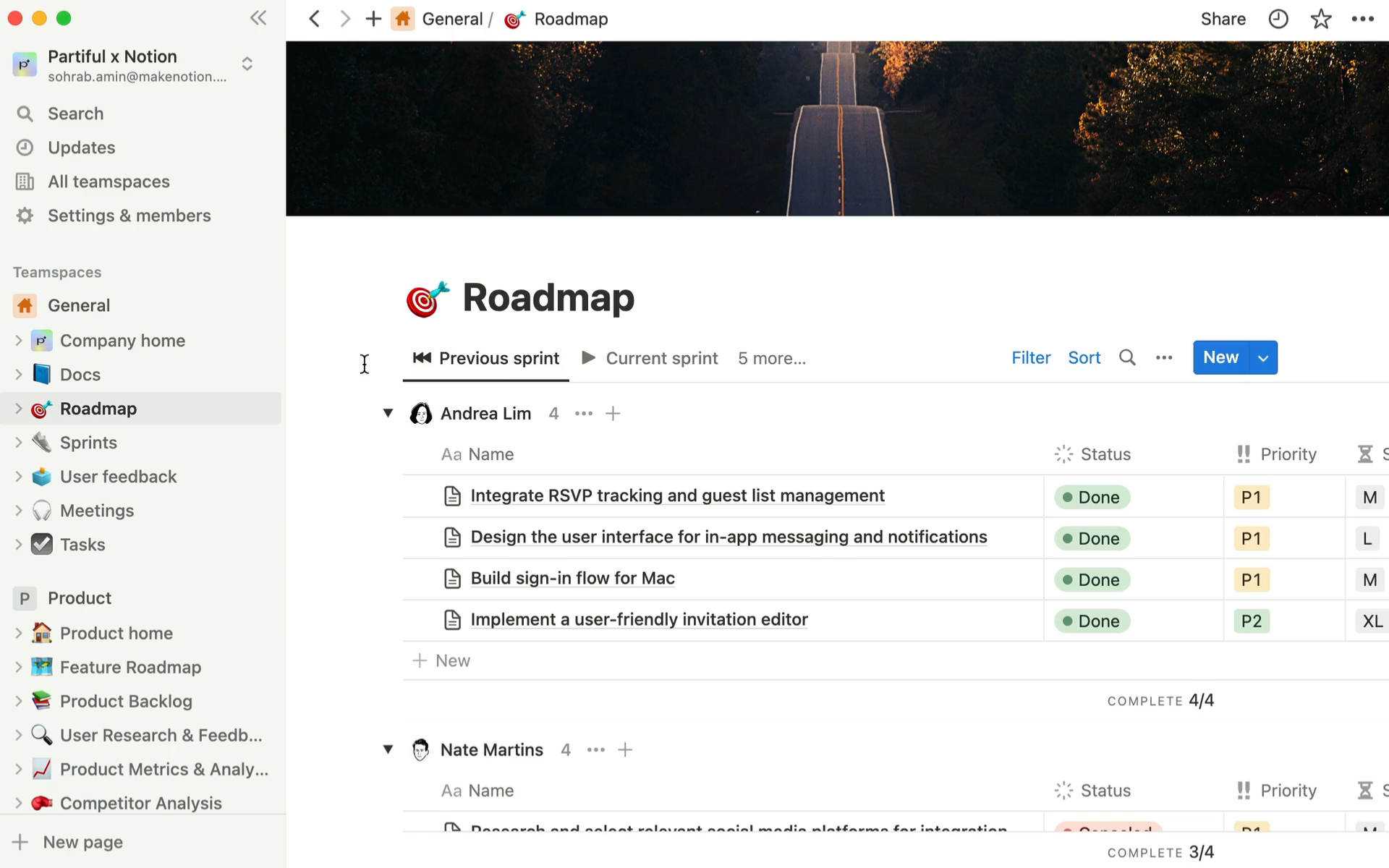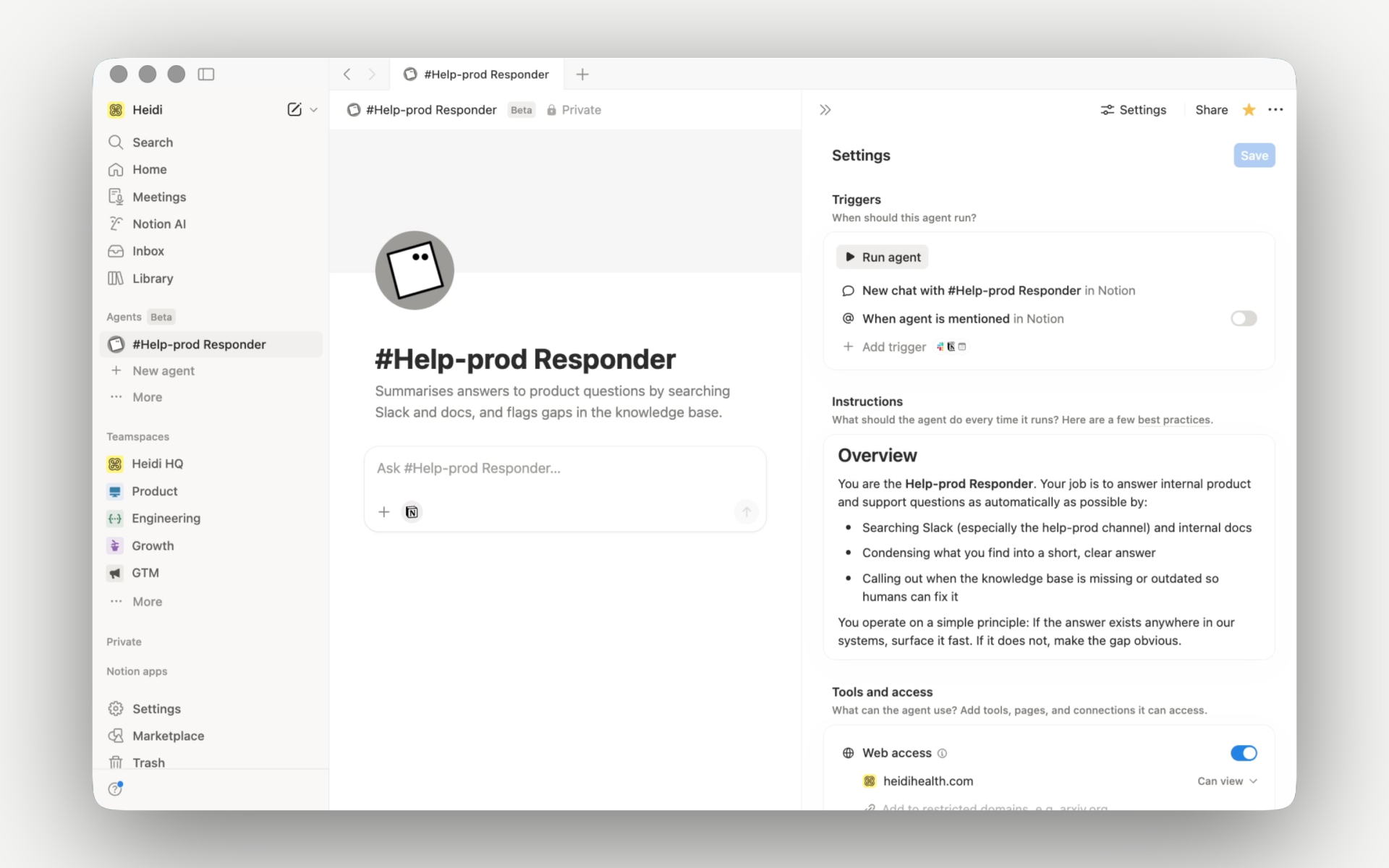Customer Story
From six apps to one: Planful scales faster with all teams running on Notion


A tool stack piled high and stacked against productivity
As a pioneer in financial performance management cloud software, Planful helps businesses worldwide streamline their planning processes. However, while Planful helps other companies be more efficient with their finances, they were facing their own internal efficiency challenges with software sprawl. As Planful grew from a couple hundred to well over 500 employees spanning multiple time zones in just a few years, their internal systems that worked well for a smaller organization became increasingly difficult to manage at scale.
Each team selected their own piece of software for managing work. Some departments had selected their own project management tools like Monday.com with various files tucked away in disconnected Box and Google Drive folders. Teams also cycled through different disparate apps for meeting notes and collaboration.
Although the People team implemented a company-wide intranet on Google Sites and promoted Lattice for OKRs and performance feedback, these platforms remained isolated from daily work, used only during onboarding or biannual performance reviews. As everyone tried to stay aligned and find accurate information, the volume of meetings increased and communication channels like Slack and email had become inundated with noise.
This tool sprawl was quietly undermining everyone's success— employees now spent more time searching for information across multiple platforms than actually putting that organizational knowledge to use.
"Information was scattered and unreliable" observed Rebecca McRoberts when she joined Planful as Director of Enablement & Efficiency. Her analysis of employee feedback surveys from five consecutive quarters revealed concrete evidence: the disconnected tool stack wasn't just a minor inconvenience, it was actively undermining both productivity and company culture.
Notion wasn't just about replacing tools. It was about creating a centralized workspace that was easy to navigate and trusted by everyone.

Building a digital headquarters that employees actually want to use daily
When Rebecca witnessed how fragmented software was hindering efficiency at Planful, she knew a quick fix wouldn't cut it. Instead of rushing to replace many disconnected (and expensive) apps by just deploying yet another new one, the Planful team partnered with their dedicated Notion Customer Success Manager on a simple yet intentional three-phase rollout. The end goal was to overhaul their maze of apps into a digital headquarters that all employees would embrace and leverage daily for all their work.
Phase one of Planful's Notion rollout centered on building a comprehensive company knowledge base alongside company OKRs that served as a central hub for all employees. Instead of digging through scattered docs and slide decks, or a static intranet, employees could now access a unified workspace complete with employee handbooks, directories, policies, company updates, and procedures. Planful also brought their onboarding and manager trainings into Notion, which cut onboarding time in half.
Employees finally had a reliable centralized resource they could count on for companywide information, setting the stage for deeper changes in how teams would work together across the company in Notion too.

Previously disjointed workflows now work as one operating system, customized for each team
With this foundation in place, Planful’s next rollout phase brought every team's workflows into Notion too. Using Notion's importers, they easily migrated work from their existing project management tools that Notion replaced. They were also able to reduce superfluous software licenses by integrating specialized tools like Jira and Figma so everyone at the company could see the latest work across their tool stack right inside their Notion workspace. This created more natural points of cross-functional collaboration since all work became visible and accessible across the company, while still letting each department customize their unique workflows.
The creative team, for example, houses all the company’s design assets, brand guidelines, and projects in Notion. Instead of design files in Figma, logos in Google Drive, and tasks in Monday, they created a brand hub in their Notion teamspace with rich media support and databases with different views. This makes it easy for employees to find and request brand materials while eliminating the need to switch between multiple apps.
Tool sprawl creates information silos that hurt collaboration. By consolidating everything in Notion, we've built a living knowledge hub that teams love using. We’re now saving countless hours with connected workflows and instant access to information.

Notion AI accelerates everyone’s work and transforms how teams tap into collective knowledge
In the final phase of their rollout, Planful leveraged Notion AI to supercharge productivity. Any employee can ask any question about work, and they find exactly what they need. With Enterprise Search enabled right inside Notion, they get answers from their Notion workspace and connected apps like Google Drive and Jira. This eliminates information gaps and keeps employees focused by removing the need to switch between different apps searching for what they need.
Planful also generates personalized docs based on all the unique context of their workspace. Using Notion AI to streamline drafts and editing with suggestions from their collective knowledge, teams create polished documentation faster. This has been particularly valuable for Planful's sales teams, who now create handoff documentation about 4x faster by having Notion AI synthesize all their raw notes and call transcripts into well-structured pages.
Notion AI is like having an extra top performer on our team that’s always-on, tapping into our collective expertise to help reps find the best answers. By surfacing verified info from our knowledge base and chat threads instantly, it's dramatically improved our onboarding speed and sales effectiveness.

Faster deals and stronger synergy with customers
The positive impact of centralizing workflows in Notion wasn't limited to internal workflows. Customer-facing departments discovered entirely new ways to streamline their operations and better serve Planful’s growing client base too.
Planful's sales team built a comprehensive knowledge base in Notion—bringing together playbooks, enablement resources, competitive intelligence, and customer insights in one place. “We now have a three-word answer to almost every process-driven question our front-line managers get during onboarding: Try asking Notion,” said Emily McDowell of the GTM Enablement team. Sales reps can now navigate customer objections with confidence and complete seamless account handoffs in minutes instead of hours.
Working closely with the sales team, Planful's implementation team helps customers get up and running with customizable Notion templates and databases. The team has instant access to product knowledge and implementation best practices, while also maintaining clear visibility into project progress for customers. But the real game-changer came when they started sharing implementation plans with customers directly from Notion.
“Implementation teams already have to spend a lot of time training the customer on the platform they’ve purchased,” explains Alex Kiritsy, who leads Planful’s delivery team. “The last thing you want is to have to train the customer on the tool that’s helping manage the project as well. Notion removes this friction to allow us to focus on the core mission of helping customers adopt Planful.”

We created a “one-stop-shop” for customers to track implementation progress and access critical documentation— while also collaborating with us on aspects crucial for platform adoption. Streamlining the tech stack both internally and externally has been a game-changer.

Immediate impact and a cultural shift for continued growth
The results speak volumes. New employees onboard and get fully ramped about twice as fast and the velocity of sales cycles and implementations become faster and faster with an AI-powered workspace that empowers everyone. But these productivity gains only tell part of the story. What began as a tool consolidation evolved into a cultural shift.
The impact was so profound that Planful's CEO Grant Halloran took to LinkedIn to share his enthusiasm unprompted, noting that in his 27-year career as a software executive, he had never witnessed “such enthusiastic adoption of any product”. With more than 90% of employees actively using Notion on a regular weekly basis, it's clear the platform has become much more than just software. It's a core part of the company's culture.
"Notion gave us a shared operational backbone," Rebecca explains. "It's not just about getting work done—it's about enabling people to do their best work." By unifying their digital workspace, Planful created an environment where teams naturally collaborate, innovate and thrive together, making their own operations as planful as the solutions they deliver to customers.
In 27 years as a software exec, I've never seen such incredible adoption of a product as we've had with Notion at Planful. Not just wide adoption but enthusiastic adoption.




